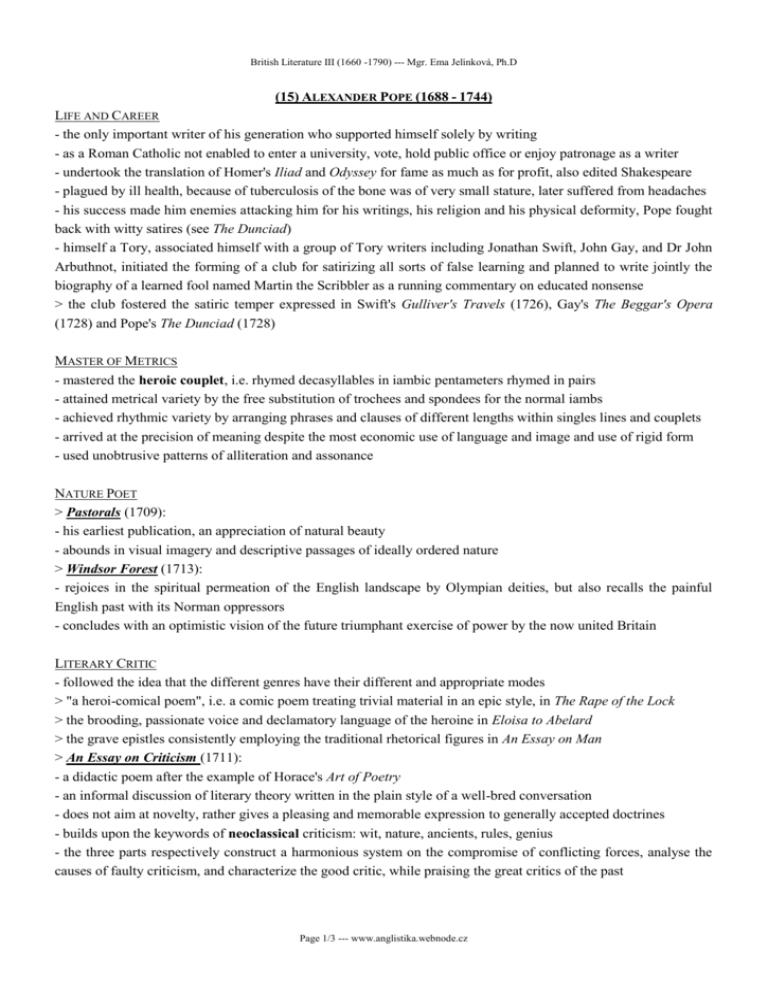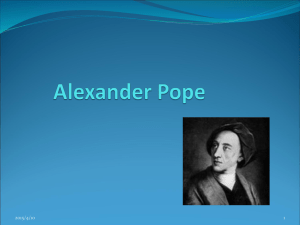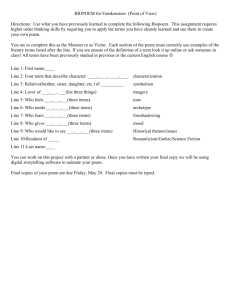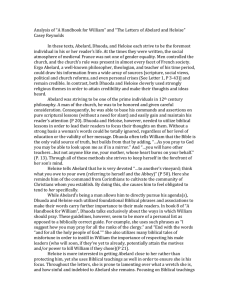Alexander Pope.doc
advertisement

British Literature III (1660 -1790) --- Mgr. Ema Jelínková, Ph.D (15) ALEXANDER POPE (1688 - 1744) LIFE AND CAREER - the only important writer of his generation who supported himself solely by writing - as a Roman Catholic not enabled to enter a university, vote, hold public office or enjoy patronage as a writer - undertook the translation of Homer's Iliad and Odyssey for fame as much as for profit, also edited Shakespeare - plagued by ill health, because of tuberculosis of the bone was of very small stature, later suffered from headaches - his success made him enemies attacking him for his writings, his religion and his physical deformity, Pope fought back with witty satires (see The Dunciad) - himself a Tory, associated himself with a group of Tory writers including Jonathan Swift, John Gay, and Dr John Arbuthnot, initiated the forming of a club for satirizing all sorts of false learning and planned to write jointly the biography of a learned fool named Martin the Scribbler as a running commentary on educated nonsense > the club fostered the satiric temper expressed in Swift's Gulliver's Travels (1726), Gay's The Beggar's Opera (1728) and Pope's The Dunciad (1728) MASTER OF METRICS - mastered the heroic couplet, i.e. rhymed decasyllables in iambic pentameters rhymed in pairs - attained metrical variety by the free substitution of trochees and spondees for the normal iambs - achieved rhythmic variety by arranging phrases and clauses of different lengths within singles lines and couplets - arrived at the precision of meaning despite the most economic use of language and image and use of rigid form - used unobtrusive patterns of alliteration and assonance NATURE POET > Pastorals (1709): - his earliest publication, an appreciation of natural beauty - abounds in visual imagery and descriptive passages of ideally ordered nature > Windsor Forest (1713): - rejoices in the spiritual permeation of the English landscape by Olympian deities, but also recalls the painful English past with its Norman oppressors - concludes with an optimistic vision of the future triumphant exercise of power by the now united Britain LITERARY CRITIC - followed the idea that the different genres have their different and appropriate modes > "a heroi-comical poem", i.e. a comic poem treating trivial material in an epic style, in The Rape of the Lock > the brooding, passionate voice and declamatory language of the heroine in Eloisa to Abelard > the grave epistles consistently employing the traditional rhetorical figures in An Essay on Man > An Essay on Criticism (1711): - a didactic poem after the example of Horace's Art of Poetry - an informal discussion of literary theory written in the plain style of a well-bred conversation - does not aim at novelty, rather gives a pleasing and memorable expression to generally accepted doctrines - builds upon the keywords of neoclassical criticism: wit, nature, ancients, rules, genius - the three parts respectively construct a harmonious system on the compromise of conflicting forces, analyse the causes of faulty criticism, and characterize the good critic, while praising the great critics of the past Page 1/3 --- www.anglistika.webnode.cz British Literature III (1660 -1790) --- Mgr. Ema Jelínková, Ph.D LOVE POET > Eloisa to Abelard (1717): - based on the 12th century story of a young woman's illicit love and secret marriage to her teacher who is punished by castration by her parents, on which Abelard enters a monastery and makes Eloisa do the same - years later Eloisa accidentally comes across Abelard's autobiographical philosophical writing, her passions reawakens, and the two exchange letters trying to find the meaning of their personal tragedy > Elegy to the Memory of an Unfortunate Lady (1717): - concerned in a sympathetic tone with the subject of suicide committed by the unnamed lady out of unhappy love SATIRIST - usually used fictional or type names, although most often had an individual in mind - created the fictional I of the satires, a detached observer judging and censoring the age > The Rape of the Lock (1712, 1714): - a witty urbane satire in the mock-epic genre - based on an actual episode that provoked a quarrel between two families: Lord Petre had cut off a lock of hair from the head of Arabella Fermor, which caused much indignation on the part of the lady and her family - elaborates the trivial episode into a playful and fanciful comic-heroic poem resembling an epic in miniature - abounds in parodies and echoes of Homer's Iliad, Virgil's Aeneid and Milton's Paradise Lost - the original version consisted of two cantos only, later Pope extended the poem into five cantos, added the "machinery", i.e. the supernatural agents in epic action, and other devices > The Dunciad (1728, 1743): - stigmatizes his literary enemies as agents of all that he feared in the tendencies of his time: the vulgarization of taste due to the growth of the reading public and cheap popular publications, the commercial spirit in general - unlike in his other satires names actual persons to raise his victims to emblems of folly and vice - unlike in other satires does not attempt to uphold the ideals of reasonableness, good sense, and balance, but contemplates the triumph of the goddess of Dullness, the patron of dunces and the destroyer of order and intellect - concludes with an apocalyptic vision of the prospective undoing of universe brought about by human ignorance > Epistle to Dr Arbuthnot (1735): - bitterly indicts a shabby and corrupt society from which the true artist remains detached and withdrawn - presents specific persons under fictional names and identifies them as symptoms of a social and aesthetic malaise PHILOSOPHY, ETHICS, AND POLITICS - perceived the reigns of George I and George II as a period of rapid moral, political, and cultural deterioration - criticizes the rise of moneyed as opposed to landed wealth, the vulgar class of nouveaux riches and political corruption encouraged by Sir Robert Walpole > An Essay on Man (1734): - a philosophical discussion in a stately tone of such majestic themes as the Creator and His creation, the universe, human nature, society, happiness etc. - lays an insistent stress on the concept of a pervasive order which links human beings to nature, creature to creature, and creature to Creator in a "vast chain of being" > Epistles to Several Persons (also as Moral Essays, 1735): - formally a series of four verse letters addressed to carefully selected figures: one of them to Martha Blount, an intimate friend, the others to prominent aristocratic national figures or arbiters of taste Page 2/3 --- www.anglistika.webnode.cz British Literature III (1660 -1790) --- Mgr. Ema Jelínková, Ph.D - the first two deal with various aspects of the passions in men and women, the other two with the use of riches and with the taste in art or lack of it > Imitations of Horace (1738): - manifests Pope's mastery of the plain style of the Roman poet's epistles and satires and establishes him as his heir Page 3/3 --- www.anglistika.webnode.cz









